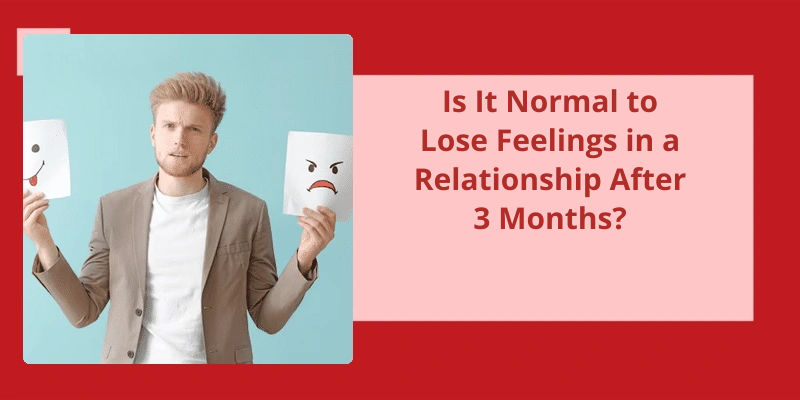Relationships are complex and ever-evolving. While some couples may experience intense love and passion from the moment they meet, others may find that their feelings wane over time. After three months, the honeymoon period may have ended, and the couple may have settled into a more comfortable routine. It isn’t uncommon for one or both partners to experience a decrease in emotional intensity during this period. However, whether this loss of feelings is normal or cause for concern varies depending on the individual relationship and the dynamics between the partners. Some relationships may recover and become stronger after this stage, while others may fizzle out entirely. Therefore, it’s crucial to assess the nature of the relationship and communicate with one's partner before making any assumptions about the state of the relationship.
How Should a Relationship Feel After 3 Months?
This is the stage where you should be able to communicate more openly with one another and make a conscious effort to understand each others needs and desires. By now, you should also have a good idea of what you both enjoy doing together and what you’d like to avoid. This newfound understanding and comfort should lead to a stronger bond and a more fulfilling experience for both parties.
It’s important to keep in mind that every relationship is different and there’s no one “right” way to feel after three months of dating. However, some common signs of a healthy relationship at this stage may include feeling secure, happy, and fulfilled in each others company. You may find yourself looking forward to spending time together more frequently and find it easier to compromise on your differences.
At the same time, it’s natural to experience some challenges in any relationship, especially during the initial months. It’s important to remember that these challenges are normal and can be overcome with open communication and a willingness to work through any issues together. You may need to make some adjustments to your expectations or approach, but with time and effort, you can build a stronger and more fulfilling connection.
One key factor to consider at this stage is the level of commitment that each person is comfortable with. Some couples may want to explore a more serious relationship, while others may prefer to keep things casual for a while longer. It’s important to have a clear understanding of where you both stand and to be honest about your feelings and intentions.
You should feel comfortable, happy, and supported in each others company, while also being open and honest about any challenges or concerns that arise. By focusing on communication, empathy, and mutual respect, you can build a strong and lasting connection that will continue to deepen and evolve over time.
How to Recognize Red Flags in a Relationship After Three Months
- Your partner tries to control your every move
- Your partner doesn’t respect your boundaries
- Your partner is always jealous or insecure
- Your partner makes you feel guilty for spending time with friends or family
- Your partner constantly criticizes or belittles you
- Your partner is manipulative or gaslights you
- Your partner makes excuses or blames you for their behavior
- Your partner has anger management issues
- Your partner never takes responsibility for their actions
- Your partner lies or keeps secrets from you
Taking a break from a relationship can be a difficult decision, and it’s important to approach it with clear intentions and boundaries. One aspect of a relationship break that often comes into question is how long it should last. While there’s no one-size-fits-all answer, many relationship experts recommend setting a baseline of three weeks apart. According to some professionals, this timeframe allows for enough space to let your body and mind adjust, while also giving you and your partner enough time to reflect on the relationship and your feelings.
How Long Should a Relationship Break Last?
“Then you need another week to figure out what your goals are, what you’re going to do with the time that you’ve while you’re apart, and whether you want to get back together or not.”. The third week is when you start to really process your emotions and begin making decisions about the future of your relationship.
Of course, not every relationship break needs to be exactly three weeks long. Some couples may feel they need more space or time to work through issues, while others may find that a shorter break is sufficient. Ultimately, the key is to take enough time to truly reflect on your feelings and needs without losing sight of what brought you together in the first place.
During this time apart, it’s important to maintain open communication and set clear expectations about what you both want from the break. This can include things like whether you”ll see other people or how often you”ll check in with each other. It’s also a good idea to engage in self-care activities, such as exercise, meditation, or therapy, to help you process your emotions and gain clarity about your thoughts and feelings.
At the end of the break, it’s important to come back together to discuss what you”ve learned and whether you want to continue the relationship. This conversation should be honest and non-judgmental, allowing both partners to share their thoughts and feelings without feeling defensive or attacked. From there, you can make a decision about the future of your relationship based on your individual needs and goals.
While a relationship break can be difficult and emotionally challenging, taking the time to work through issues and assess your feelings can ultimately strengthen your relationship in the long run. By setting clear parameters and maintaining open communication, you can ensure that you both have the time and space you need to reflect, grow, and make informed decisions about the future of your relationship.
Source: Taking a Break in a Relationship: 6 Tips For Couples on a Break
As humans, we’re always seeking love and companionship. Relationships can be a beautiful thing, but unfortunately, they often end in heartbreak. Studies have shown that more often than not, relationships don’t make it past the three-month mark. But why is that? Is it simply because the initial spark fades, or is there more to it? The dating app Inner Circle conducted research on this topic and uncovered some fascinating insights into why relationships end after just three months. Let’s take a closer look.
Why Do Relationships End After 3 Months?
The first three months of a relationship are often referred to as the honeymoon phase. This is the time when both partners are infatuated with each other and everything seems perfect. However, as time goes on, the honeymoon phase fades and the reality of the relationship sets in. This can lead to differences in expectations and ultimately contribute to the end of the relationship.
Another factor that can contribute to the end of a relationship after three months is lack of communication. When partners are in the early stages of a relationship, they may be hesitant to have difficult conversations or bring up topics that could lead to conflict. Over time, this lack of communication can cause resentments to build up and ultimately lead to the end of the relationship.
Additionally, external factors such as work or family pressures can contribute to relationship breakdowns. If one partner is dealing with a particularly stressful work situation or family problem, they may not have as much time or emotional energy to invest in the relationship. This can cause the other partner to feel neglected or unimportant, leading to the end of the relationship.
While some might argue that six months is the ideal time frame for a relationship to become serious, there are no hard and fast rules when it comes to matters of the heart. Everyone’s relationship journey is unique, and the timeline for when a couple becomes serious can vary greatly.
How Many Months Does It Take for a Relationship to Be Serious?
While six months may seem like a short period of time, it’s an important milestone in a relationship. It represents a significant amount of time where you’ve both had the opportunity to get to know each other on a deeper level and establish a connection. By this point, you should have a good understanding of each others likes, dislikes, and values, which lays the foundation for a future together.
Of course, the speed at which a relationship progresses can vary for every couple. Some may reach this point sooner, while others may take longer. It’s essential to remember that there’s no set timeline for when a relationship needs to be considered serious. It’s ultimately up to each individual couple to decide when the time is right for them.
That being said, it’s important to check in with yourself and your partner at regular intervals throughout the relationship. Are you both on the same page regarding your feelings and future plans? Communication is key to ensuring that you’re both moving forward in the same direction and that your expectations align.
Another factor that can impact the timing of when a relationship becomes serious is how often you see each other. If you only see each other once a week or less, it may take longer to establish a deeper connection compared to a couple who spends several days a week together. Quality time spent together is crucial to building a strong foundation.
Taking some time off after a breakup is often seen as a necessary step towards healing. The popularized 3-month relationship break rule aims to give both parties involved the space they need to move on and start anew. While this dictation may seem like an arbitrary rule to follow, it actually has a lot of merit behind it. Let’s explore the 3-month relationship break and it’s purpose in further detail.
What Is the 3-Month Relationship Break?
When a relationship ends, it can be an emotional rollercoaster for all parties involved. The 3-month relationship break is a period of time where the previously linked individuals are advised to take a step back and reflect on their past relationship. This time creates space for individuals to heal from the emotional turmoil and evaluate whether or not they still want to pursue a future with their ex-partner.
The post-breakup 3-month rule encourages individuals to focus on themselves before jumping into another relationship. It’s important to understand that relationships aren’t a quick fix for feelings of loneliness or unhappiness. By taking time to reflect on the past relationship, individuals can identify patterns and behaviors that may have contributed to the breakup. This can be a time for personal growth and self-improvement.
Forgiveness is a key element of the 3-month relationship break. It isn’t uncommon for breakups to be accompanied by feelings of anger and hurt, but taking time to work through these emotions can lead to a more amicable future relationship. Forgiveness isn’t always easy, but it can be incredibly healing for both parties involved.
During the 3-month break, individuals are encouraged to maintain their distance from their ex-partner. This means avoiding unnecessary communication or contact, especially if it causes emotional distress. It’s a time to prioritize self-care and mental health, focusing on personal goals and hobbies.
How to Effectively Use the 3-Month Break to Improve Personal Growth and Self-Improvement.
In this article, we discuss some useful ways to make the most of the 3-month break to improve personal growth and self-improvement. We cover both practical and emotional strategies that can help you learn new skills, build confidence, self-reflect, and rejuvenate for the next chapter. From taking online courses to journaling, meditating, and traveling, there are many options to explore based on your interests and goals. The key is to stay focused and committed to your plan, while being open to the unexpected opportunities that may arise.
Conclusion
In conclusion, relationships are complex and unique to each individual. While there may be societal expectations regarding the timeline of developing and maintaining romantic feelings, it’s important to remember that every person and every relationship is different. It’s perfectly normal for feelings to ebb and flow throughout the course of a relationship, and it’s crucial for partners to communicate openly and honestly with each other about their emotions. Ultimately, the success and longevity of a relationship depends on many factors, including communication, trust, mutual respect, and a willingness to continue growing and evolving together over time.






